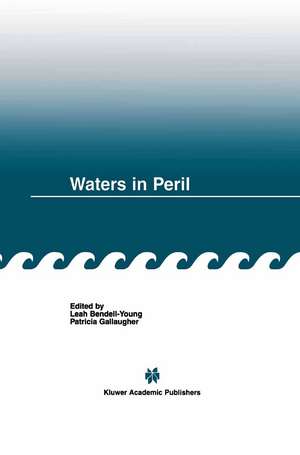Waters in Peril
Editat de Leah Bendell-Young, Patricia Gallaugheren Limba Engleză Hardback – 30 noi 2001
| Toate formatele și edițiile | Preț | Express |
|---|---|---|
| Paperback (1) | 639.41 lei 6-8 săpt. | |
| Springer Us – 21 sep 2012 | 639.41 lei 6-8 săpt. | |
| Hardback (1) | 646.43 lei 6-8 săpt. | |
| Springer Us – 30 noi 2001 | 646.43 lei 6-8 săpt. |
Preț: 646.43 lei
Preț vechi: 760.50 lei
-15% Nou
Puncte Express: 970
Preț estimativ în valută:
123.71€ • 128.17$ • 103.24£
123.71€ • 128.17$ • 103.24£
Carte tipărită la comandă
Livrare economică 22 martie-05 aprilie
Preluare comenzi: 021 569.72.76
Specificații
ISBN-13: 9780792375043
ISBN-10: 0792375041
Pagini: 248
Ilustrații: XXIV, 248 p.
Dimensiuni: 155 x 235 x 21 mm
Greutate: 0.59 kg
Ediția:2001
Editura: Springer Us
Colecția Springer
Locul publicării:New York, NY, United States
ISBN-10: 0792375041
Pagini: 248
Ilustrații: XXIV, 248 p.
Dimensiuni: 155 x 235 x 21 mm
Greutate: 0.59 kg
Ediția:2001
Editura: Springer Us
Colecția Springer
Locul publicării:New York, NY, United States
Public țintă
ResearchCuprins
I — Biodiversity.- 1: Biological Invasions of Marine Ecosystems: Patterns, Effects, and Managemen.- 2: Known and Unknown Biodiversity, Risk of Extinction and Conservation Strategy in The Sea.- 3: Deep-Sea Fisheries: Perspectives and Lessons.- 4: Fishing Down Marine Food Webs: An Update.- 5: Ecological Implications of the Shellfishery; A Case Study on the West Coast of British Columbia, Canada.- II — Marine Ecosystem Function.- 6: The Oceanic Nitrogen Cycle: A Double-Edged Agent of Environmental Change?.- 7: Beyond Algal Blooms, Oxygen Deficits and Fish Kills: Chronic, Long-Term Impacts of Nutrient Pollution on Aquatic Ecosystems.- 8: Responses of Pelagic Marine Ecosystems to Climate Change — Can We Predict Them?.- 9: The Arctic Ocean and Contaminants: Pathways that Lead to Us.- 10: Shouldn’t We Be Putting Our Sulphide-Rich Mine Tailings in the Ocean or in Lakes Rather than on Land?.- III — Towards Solutions.- 11: The Cumulative Effects of Climate Warming and Other Human Stresses on Canadian Freshwaters in the New Millennium.- 12: Marine Biological Diversity: Conserving Life in the Neglected Ninety-nine Percent.- 13: Human Ecology, Material Consumption, and the Sea: Indices of Human Ecological Dysfunction.- 14: Prevention is Better Than Cure: Systems of ‘No-Take’ Marine Reserves.
Recenzii
'I would certainly recommend that this book be put on the reading list for any ecological or environmental degree course.'
Biological Conservation, 107 (2002)
`Waters in Peril is nevertheless a very useful, well-written and up-to-date review of the global status of our oceans and their conservation. This is a valuable addition to undergraduate or postgraduate courses on marine conservation, biodiversity and pollution. ...highly recommend this book to the libraries of universities and marine research institutes.'
Hydrobiologia, 493 (2003)
Biological Conservation, 107 (2002)
`Waters in Peril is nevertheless a very useful, well-written and up-to-date review of the global status of our oceans and their conservation. This is a valuable addition to undergraduate or postgraduate courses on marine conservation, biodiversity and pollution. ...highly recommend this book to the libraries of universities and marine research institutes.'
Hydrobiologia, 493 (2003)













